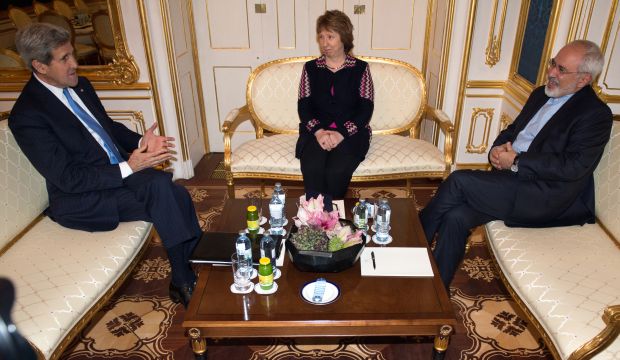
US Secretary of State John Kerry (L), former EU Foreign Policy Chief Catherine Ashton (C) and Iranian Foreign Minister Mohammad Javad Zarif (R) meet for talks on the sidelines of nuclear talks with Iran aimed at settling a dispute over Iran’s nuclear program at the Palais Coburg in Vienna on November 22, 2014. (AP Photo/Joe Klamar, Pool)
Vienna and London, Asharq Al-Awsat—The failure of the talks on Iran’s nuclear program in Vienna could threaten regional stability, an Iranian official told Asharq Al-Awsat on Saturday, as hopes that a deal will be reached before Monday’s deadline fade.
Ali Khorram, an adviser to Iranian Foreign Minister Mohammad Javad Zarif, said: “The failure of the talks will strengthen the [positions of] extremists on both sides and will create chaotic and dangerous results both regionally and internationally.”
Negotiators from Iran and the five permanent members of the UN Security Council and Germany, known as the P5+1, have been meeting in Vienna over the past week in a last-ditch bid to resolve the dispute over Iran’s nuclear activities.
The negotiators were joined by US Secretary of State John Kerry late last week, as both sides struggle to reach an agreement acceptable to their governments back home.
Kerry met with Zarif on Saturday in the Austrian capital and also had telephone conversations with his counterparts in Saudi Arabia, the UAE, Kuwait, Qatar and Bahrain, as well as Turkey, according to a statement by the US State Department.
Speaking of Kerry’s efforts, Khorram said: “This shows the US’s strong desire for an agreement to be reached . . . and now we are negotiating on a deal that is more practical from an Iranian point of view compared with the talks that went on in Muscat.”
High-level talks between Iran and P5+1 were held in the Omani capital Muscat prior to the ongoing negotiations in Vienna, but did not yield an agreement.
Although reports say that some progress has been made in Vienna, others say that it is now unlikely that an agreement will be struck before Monday, when the self-imposed deadline agreed this time last year is due to expire.
One of the main sticking points in the talks thus far has been the size of Iran’s uranium enrichment capacity. Tehran wants to maintain an extensive infrastructure of centrifuges, while at the same time insisting its motives are entirely peaceful. The P5+1, however, insist a reduction is necessary in order to ensure them the Islamic Republic is not seeking to use the uranium enriched in its centrifuges to produce nuclear weapons.
Speaking to Asharq Al-Awsat, UK foreign office spokesperson Farah Dakhlallah said: “A deal will only be possible if Iran agrees to meaningful restrictions on its nuclear program.”
This would be the only way that the P5+1 would be certain Iran’s nuclear ambitions were entirely peaceful, the spokesperson added.
Iran also wants international economic sanctions removed immediately following any deal, with the P5+1 insisting these should be phased out gradually.
US sanctions as a result of Iran’s nuclear program have been in place since 2006, and have mainly targeted the country’s lucrative oil and gas industries. Financial sanctions are also in place, barring international financial institutions of carrying out any transactions with the Islamic Republic.
The sanctions have a had a heavy toll on the Iranian economy, resulting in high inflation rates that have put some ordinary products beyond the reach of most Iranians, while government subsidies to make them more affordable have in turn worsened the government’s already dire financial position.
Since Iran and the P5+1 reached an interim agreement in Geneva last November, some of these sanctions have been lifted, and Iran has received payments which were frozen when the sanctions were imposed. The P5+1 also agreed not to impose further sanctions while Iran abides by the agreement.
Dakhlallah said that should the talks fail to reach an agreement before the deadline, the limited sanctions relief Iran has enjoyed since last November would cease and further sanctions to those currently in place could be imposed.
Ali M. Pedram contributed reporting from London.

Trackbacks/Pingbacks